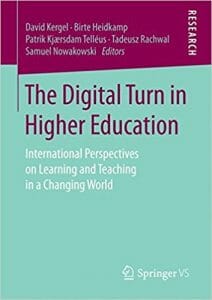
Whether you’re an instructional designer, researcher, or educator, it is important to stay on top of new developments in the field. Here are eLearningInside News’ recommendations for five new books on eLearning and ed tech. If these titles have a common theme, it is certainly change and uncertainty. From a critical investigation about how and when to start feeding children a digital diet to technical and theoretical discussions on AI and machine learning, these new titles serve as yet another reminder of the massive disruptions currently under way in K-12 education, higher education, and training.
Education and New Technologies: Perils and Promises for Learners
 Published in mid December 2017, this new edited collection by UK-based researchers Kieron Sheehy and Andrew Holliman explores a series of questions on many people’s minds: When should children go online? Is too much screen time harmful to children? What should we do to curtail their online usage? Can we leverage digital technologies to the benefit of children? Are we overreacting like we have in the past to other new technologies? Whether you’re an early childhood educator, parent or just a concerned digital citizen, Education and New Technologies, available from Routledge, is a great place to begin exploring what’s at stake as children engage with digital technologies at an increasingly young age.
Published in mid December 2017, this new edited collection by UK-based researchers Kieron Sheehy and Andrew Holliman explores a series of questions on many people’s minds: When should children go online? Is too much screen time harmful to children? What should we do to curtail their online usage? Can we leverage digital technologies to the benefit of children? Are we overreacting like we have in the past to other new technologies? Whether you’re an early childhood educator, parent or just a concerned digital citizen, Education and New Technologies, available from Routledge, is a great place to begin exploring what’s at stake as children engage with digital technologies at an increasingly young age.
Everyday Schooling in the Digital Age: High School, High Tech?
 Everyday Schooling in a Digital Age by Neil Selwyn, Selena Nemorin, Scott Bulfin, and Nicola K. Johnson was published by Routledge in November 2017. Based on a major ethnographic study, the book investigates the leadership and management of technology in schools and teachers’ evolving work. From case studies on personalized learning apps and social media to 3D printers, Everyday Schooling in the Digital Age is at once both a practical guide and investigative dive into the changing nature of secondary education in a digital age. Specific chapters tackle issues ranging from leadership to the realities of managing one-on-one technology provision to the complex ways in which teachers’ work has been and will continue to be transformed by new technologies.
Everyday Schooling in a Digital Age by Neil Selwyn, Selena Nemorin, Scott Bulfin, and Nicola K. Johnson was published by Routledge in November 2017. Based on a major ethnographic study, the book investigates the leadership and management of technology in schools and teachers’ evolving work. From case studies on personalized learning apps and social media to 3D printers, Everyday Schooling in the Digital Age is at once both a practical guide and investigative dive into the changing nature of secondary education in a digital age. Specific chapters tackle issues ranging from leadership to the realities of managing one-on-one technology provision to the complex ways in which teachers’ work has been and will continue to be transformed by new technologies.AI Injected e-Learning: The Future of Online Education
 In October 2017, Springer published Matthew Montebello’s AI Injected e-Learning. This is a book explores how AI is transforming elearning in three key ways: crowdsourcing via social networks; user profiling; and personalized learning. Although the book is primarily intended for education technologists and researchers, it is still introductory enough to be accessible to anyone interested in learning more about AI-based eLearning technique such as machine learning.
In October 2017, Springer published Matthew Montebello’s AI Injected e-Learning. This is a book explores how AI is transforming elearning in three key ways: crowdsourcing via social networks; user profiling; and personalized learning. Although the book is primarily intended for education technologists and researchers, it is still introductory enough to be accessible to anyone interested in learning more about AI-based eLearning technique such as machine learning.
The Digital Turn in Higher Education: International Perspectives on Learning and Teaching in a Changing World
 David Kergel and Birte Heidkamp’s new edited collection from Springer, The Digital Turn in Higher Education, investigates the changing landscape of edtech in the postsecondary space. From best practices to theoretical reflections and methodological investigations, The Digital Turn in Higher Education will no doubt find a broadranging audience among educators, administrators, researchers, and educational technologists. The book is also very international in scope. Unlike many edtech books, it is not just offering North American and European views but offers insights on edtech from around the globe.
David Kergel and Birte Heidkamp’s new edited collection from Springer, The Digital Turn in Higher Education, investigates the changing landscape of edtech in the postsecondary space. From best practices to theoretical reflections and methodological investigations, The Digital Turn in Higher Education will no doubt find a broadranging audience among educators, administrators, researchers, and educational technologists. The book is also very international in scope. Unlike many edtech books, it is not just offering North American and European views but offers insights on edtech from around the globe. Transactional Distance and Adaptive Learning: Planning for the Future of Higher Education
 While Transactional Distance and Adaptive Learning may sound like a highly esoteric work, this new book by Farhad Saba and Rick L. Shearer actually tackles an increasingly important issue in education and training: the shift from one-size-fits-all models of learning to learner-centered forms of education. In essence, the theory of transactional distance (TTD) offers a unique foundation. Whether you’re an administrator exploring new technologies to transform your institution or an educator, Transactional Distance and Adaptive Learning offers a thorough overview of these pressing issues.
While Transactional Distance and Adaptive Learning may sound like a highly esoteric work, this new book by Farhad Saba and Rick L. Shearer actually tackles an increasingly important issue in education and training: the shift from one-size-fits-all models of learning to learner-centered forms of education. In essence, the theory of transactional distance (TTD) offers a unique foundation. Whether you’re an administrator exploring new technologies to transform your institution or an educator, Transactional Distance and Adaptive Learning offers a thorough overview of these pressing issues.









One Comment